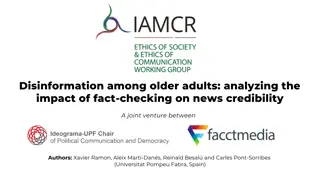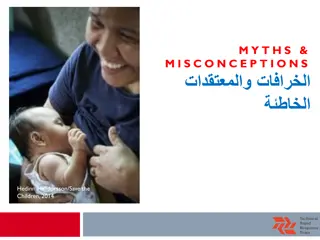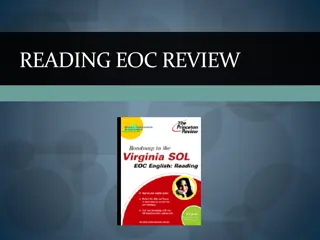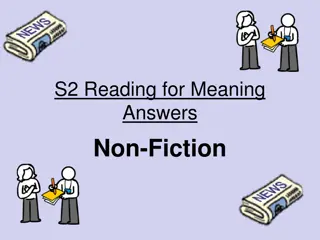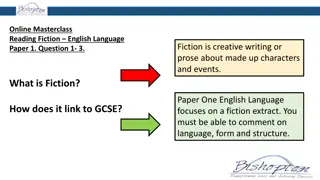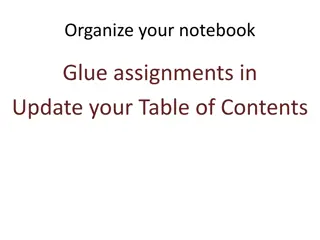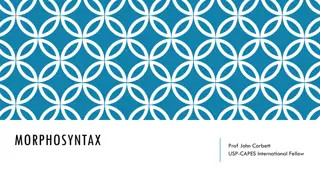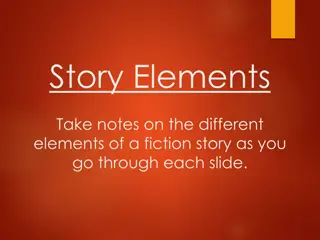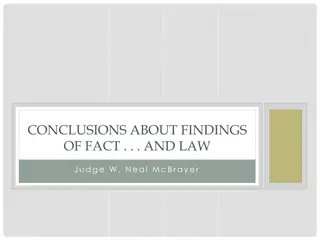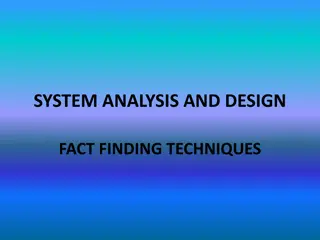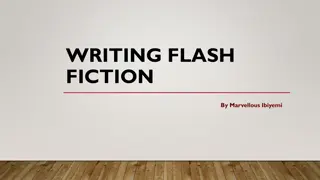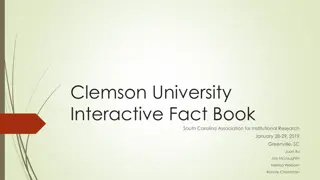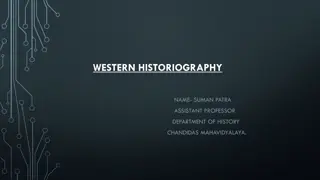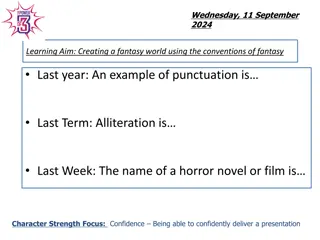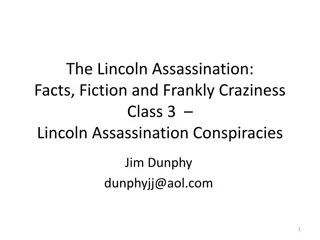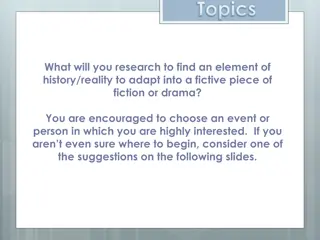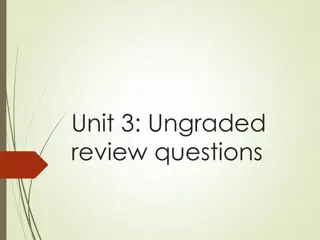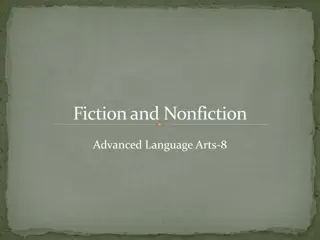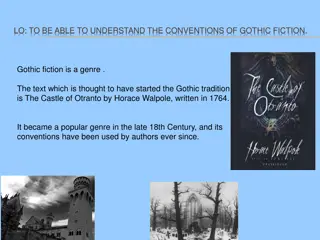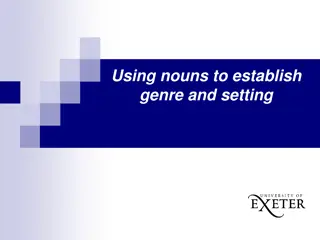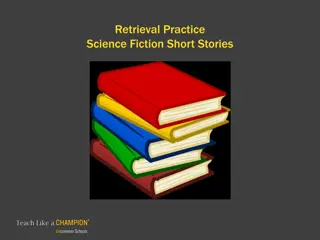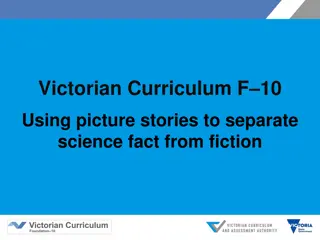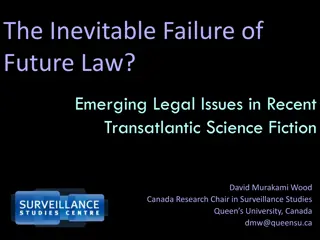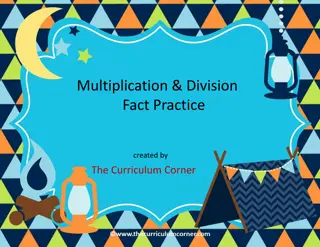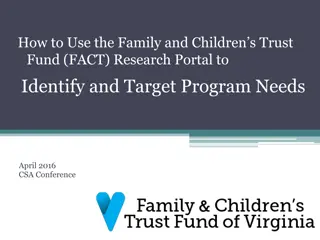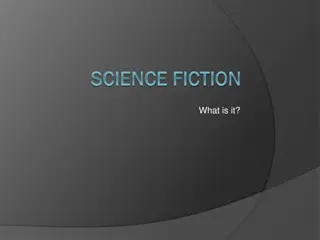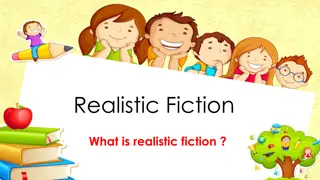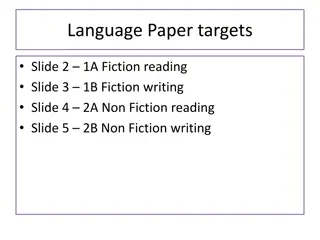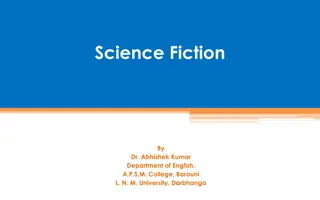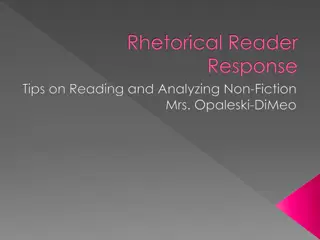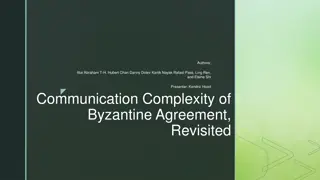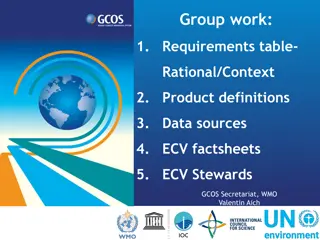Exploring Citizen Journalism and Non-Fiction Writing
Explore the world of citizen journalism and non-fiction writing, learning about text types, adapting writing to conventions, considering audience, purpose, and tone. Discover the significance and usefulness of non-fiction writing, and delve into creating various text types. Uncover the role of citiz
1 views • 11 slides
Impact of Fact-Checking on Credibility Among Older Adults
Analyzing the impact of fact-checking on news credibility among older adults reveals that age is a key factor in information credibility. Older adults tend to give more credibility to various kinds of information, leading to potential challenges in discerning between true facts and false news. Fact-
5 views • 31 slides
The Impact of Reality Television on Society
Reality television, where fact is sometimes stranger than fiction, has a significant influence on society. This form of entertainment often showcases ordinary people in various scenarios, leading to desensitization and acceptance of negative behaviors like aggression and bullying. The ethical implic
7 views • 17 slides
The Truth Revealed Does Cannabis Harm Brain Cells.docx
The Truth Revealed: Does Cannabis Harm Brain Cells?\nIn recent years, the debate surrounding the effects of cannabis on brain health has intensified. With the growing popularity of cannabis and the increasing accessibility of products from online weed dispensaries and marijuana dispensaries, it\u201
9 views • 3 slides
Debunking Breastfeeding Myths: Separating Fact from Fiction
Explore common breastfeeding myths and misconceptions in this interactive guide. Learn the truth behind statements like malnourished mothers can't breastfeed, stress affects milk production, and babies need extra fluids. Understand why it's crucial for mothers to continue breastfeeding during diarrh
1 views • 22 slides
Reading EOC Review: Test Structure, Types of Selections, and Breakdown
The Reading EOC Review covers the test makeup, types of reading selections, and breakdown of questions and content to help you prepare effectively. The test comprises sections with 55 scored questions to be answered, focusing on functional literacy and narrative/fiction elements, including poetry, p
8 views • 26 slides
Exploring Contemporary Non-Fiction Themes
Delve into diverse non-fiction topics such as pet pampering, societal contradictions in teen reading habits, environmental concerns like plastic pollution, and societal opinions on education and lifestyle choices. Discover intriguing discussions and thought-provoking insights in this engaging collec
0 views • 55 slides
Insights into Jamaica Kincaid: Relationships, Writing, and Autobiography
Explore Jamaica Kincaid's reflections on her mother, experiences growing up in Antigua, and her writing process. Delve into the autobiographical themes in her works, contemplating the blurred lines between fact and fiction in literature.
0 views • 4 slides
Understanding Fiction Through Text Analysis: Paper 1 English Language Masterclass
Delve into the world of fiction through an analysis of the novel "Girl With a Pearl Earring". Explore how language, form, and structure are used in the extract to captivate readers. Discover the characters, setting, and narrative techniques employed by the writer to engage and intrigue readers. Unco
2 views • 7 slides
Exploring Historical Fiction: Elements and Examples
Discover the essence of historical fiction, its key elements, and examples like "Forrest Gump." Learn how plausibility and interpretation play pivotal roles in creating captivating narratives that blend fiction with historical events.
0 views • 11 slides
Understanding Mood and Modality in Morphosyntax with Prof. John Corbett
Today's session with Prof. John Corbett explores the final three sets of grammatical categories related to verbs: mood (fact or non-fact), modality (speaker's stance), and voice (subject's role). The session delves into the present-day English mood system, differentiating between various realization
1 views • 24 slides
Spring 2015 English 110 Final Exam Information
Spring 2015 English 110 Final Exam includes an Essay Final Exam to be completed by May 21st and an Objective Final Exam on May 27th or May 28th. The Essay Final consists of flash fiction tasks, literary criticisms, and analysis, while the Objective Final covers fiction elements identification and an
0 views • 7 slides
Essential Elements of Fiction Storytelling
Dive into the key components that make up a compelling fiction story, including plot development, setting, mood creation, character conflicts, and the use of imagery and dialogue to enhance the reader's experience. Explore these foundational elements to enhance your storytelling skills.
1 views • 36 slides
Understanding the Distinction Between Findings of Fact and Conclusions of Law
The distinction between findings of fact and conclusions of law is explored through various legal opinions and cases. The complexity and importance of this distinction are highlighted, with instances where findings are deemed as conclusions and vice versa. Scholars and legal experts have pondered ov
0 views • 24 slides
Understanding Fact Finding Techniques in System Analysis and Design
Fact finding techniques play a crucial role in collecting essential data and information for system analysis and design. Techniques include sampling existing documentation, research, observation, questionnaires, interviews, prototyping, and joint requirements planning. Extracting facts accurately is
1 views • 8 slides
Exploring Addition and Subtraction Fact Families Warm-Up
Engage in a series of activities to discover and practice addition and subtraction fact families. These exercises will help strengthen numerical skills and foster a deeper understanding of mathematical operations. Dive into the world of numbers and boost your math proficiency through interactive lea
1 views • 7 slides
Crafting Compelling Flash Fiction: Techniques and Examples
Dive into the world of flash fiction with this informative piece detailing the essence, types, and techniques of writing succinct yet gripping stories. Learn how to hook readers from the start, use impactful scenes over summaries, and create lasting impressions with minimal words.
0 views • 18 slides
Enhancing Data Analysis for Clemson University's Fact Book
Exploring the implementation of Tableau Server for presenting Clemson University's Interactive Fact Book, including considerations for data accuracy, design consistency, and improved navigation. The report covers insights on data preparation, retention, graduation, and the importance of communicatio
0 views • 13 slides
Evolution of Historiography: From Ancient Greece to Medieval Times
Explore the evolution of historiography from the ancient Greek historians like Herodotus, Thucydides, and Xenophon to Roman historians like Polybius and Livy. Discover how medieval historiography in the Middle Ages shifted towards chronicling events with less focus on separating fact from fiction.
2 views • 20 slides
Exploring Fantasy Worlds: Conventions, Types, and Challenges
Dive into the realm of fantasy literature and learn about the conventions, types, and differences between fantasy and sci-fi. Uncover the definition of fantasy, explore popular genres, and discover sub-genres like fiction, science fiction, and historical fiction. Engage in thought-provoking challeng
0 views • 17 slides
Washington Irving: Father of American Fiction and Pioneer of American Romanticism
Washington Irving, an influential American author of the early 19th century, is revered as the Father of American fiction. Known for iconic works like "The Legend of Sleepy Hollow" and "Rip Van Winkle," Irving played a crucial role in establishing American literature as an independent art form. His
1 views • 14 slides
Unraveling Lincoln Assassination Conspiracies: Fact or Fiction?
Delve into the intriguing theories surrounding Abraham Lincoln's assassination in this class taught by Jim Dunphy. Explore various alternate scenarios, from involvement of Andrew Johnson to international bankers, as well as controversies like Booth's fate. Discover insights from William Hanchett's r
0 views • 106 slides
Historical Trials Reimagined: From Fact to Fiction
Explore how real-life American trials, tragedies, and disasters have inspired works of fiction, delving into the creative transformation of historical events into captivating narratives that resonate with audiences. From the Salem Witch Trials to the Civil War era and modern tragedies like 9/11, wit
0 views • 12 slides
Context-Aware Identification of Check-worthy Claims in Political Discussions
This work explores the intersection of man and machine in countering malicious communication in social networks, focusing on fact-checking in political discussions. The research investigates the need for technology to verify the accuracy of public figures' statements, considering the thriving field
0 views • 21 slides
Health Facts and Myths Unveiled
Discover the truths behind common health misconceptions with these ungraded review questions covering topics like causes of deaths among younger people, cardiovascular diseases, cancer, diabetes, and more. Test your knowledge and challenge yourself to differentiate fact from fiction in the world of
0 views • 11 slides
Understanding Fiction and Nonfiction in Language Arts
Fiction and nonfiction are two key genres in literature. Fiction involves imaginative storytelling with elements like plot, characters, setting, point of view, and theme. Nonfiction, on the other hand, deals with real people, events, and ideas, aiming to inform, persuade, or entertain readers. Explo
0 views • 14 slides
Understanding Gothic Fiction Conventions in Literature
Gothic fiction is a captivating genre rooted in dark, mysterious settings, supernatural elements, and eerie atmospheres. Originating with "The Castle of Otranto" by Horace Walpole, this genre has evolved to encompass elements like family curses, isolated castles, and sinister creatures. Dive into th
0 views • 25 slides
Creative Noun Usage in Science Fiction Writing
Explore the art of using nouns to establish genre, setting, and character names in science fiction writing. Learn how authors like Philip Reeve utilize proper nouns to create immersive worlds and unique characters. Delve into the significance of authentic text, discussion, and purposeful learning pr
0 views • 10 slides
Science Fiction Retrieval Practice: Short Stories Insights
Explore futuristic technologies, incongruity, and speculative fiction elements in science fiction short stories like "Robbie" and "There Will Come Soft Rains." Uncover the connections to historical events, like the Cold War, through literary analysis of these captivating narratives.
0 views • 16 slides
Enhancing Science Understanding Through Picture Stories
Explore how using picture stories can help students in the Victorian Curriculum F-10 to differentiate between science fact and fiction. The curriculum emphasizes the importance of discipline-based learning and provides a continuum of knowledge and skills essential for lifelong learning and social de
0 views • 47 slides
Exploring Legal Themes in Science Fiction: The Inevitable Failure of Future Law
This study delves into emerging legal issues in recent transatlantic science fiction works by authors like Charles Stross, Ken McLeod, and Paolo Bacigalupi. It examines the portrayal of law in SF and what insights it offers about our legal systems. Through a systematic survey of over 300 novels and
0 views • 12 slides
Math Fact Practice for Multiplication and Division
Enhance your multiplication and division skills with this interactive fact practice session. Test your knowledge with various problems and receive instant feedback on your progress. Improve your math abilities in an engaging way!
0 views • 73 slides
Utilizing the Family and Children's Trust Fund (FACT) Research Portal for Program Needs Identification and Targeting
Explore how the Family and Children's Trust Fund (FACT) in Virginia supports the prevention and treatment of family violence through data management and strategic goals. Learn about managing by data, FACT's initiatives, and the significance of prevention in addressing family violence issues.
0 views • 25 slides
Exploring the World of Science Fiction
Science fiction is a genre that delves into imagined future scientific and technological advances, exploring major societal and environmental changes, space travel, time travel, and life on other planets. It combines elements of science and fiction to create believable yet captivating narratives tha
0 views • 14 slides
Understanding Realistic Fiction: Features and Examples
Realistic fiction is a genre of writing that portrays characters, settings, and events that could exist in real life, even though the story itself may be fictional. The key features include believable characters, realistic settings, everyday problems, and plausible solutions. By sorting book covers
0 views • 9 slides
Language Paper Targets for Fiction and Non-Fiction Reading and Writing
This content provides detailed targets for Language Papers, focusing on Fiction and Non-Fiction reading and writing skills. It covers strategies such as being specific in analysis, using evidence from texts, improving sentence structures, enhancing vocabulary usage, and applying language techniques
0 views • 14 slides
Evolution of Science Fiction Literature
Science fiction genre, blending imaginative fantasy with scientific principles, has evolved significantly over time. Initially emerging in the late 1800s, it gained popularity alongside technological advancements. Theodore Sturgeon highlighted the essence of human stories within the genre. Iconic wo
0 views • 8 slides
Effective College Reading and Analysis Strategies for Non-Fiction Texts
Enhance your non-fiction reading and analysis skills with these practical tips: prepare yourself mentally before reading, preview the article, highlight key points while reading, monitor comprehension, and summarize the article afterward. Additionally, learn how to create a rhetorical précis to eff
0 views • 19 slides
Communication Complexity in Byzantine Agreement Research
The presentation discusses communication complexity in Byzantine Agreement, emphasizing a lower bound of (f/2) when After the Fact removal is considered. It explores two major contributions - the communication lower bound in randomized protocols and near-optimal subquadratic Byzantine Agreement. The
0 views • 9 slides
Comprehensive Overview of ECV Data Sourcing and Fact Sheet Creation Process
Detailed insights into the ECV data sourcing procedures, criteria for selection, and the development of fact sheets, as outlined by the GCOS Secretariat and WMO representative Valentin Aich. The content covers requirements tables, product definitions, data sources compilation steps, and the importan
0 views • 15 slides

